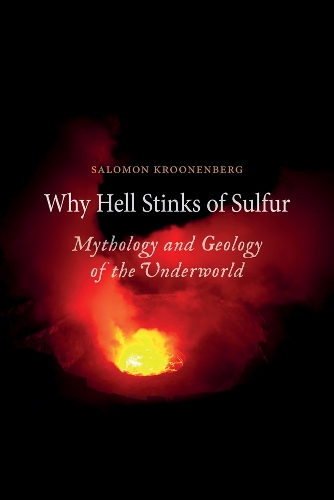
Why Hell Stinks of Sulfur: Mythology and Geology of the Underworld
(Hardback)
Publishing Details
Why Hell Stinks of Sulfur: Mythology and Geology of the Underworld
By (Author) Salomon Kroonenberg
Reaktion Books
Reaktion Books
1st November 2012
United Kingdom
Classifications
General
Non Fiction
Social and cultural history
398
Physical Properties
Hardback
304
Description
In Why Hell Stinks of Sulfur, geologist Salomon Kroonenberg uses subterranean mythology as his point of departure. Starting with Dante's Inferno, he takes the reader on a journey in the footsteps of Homer, Virgil, Leonardo, Descartes and Jules Verne. Along the way he turns a scientific spotlight on the background to myths of the underworld. At a small lake near Naples he searches for the gates of hell, as described in Virgil's Aeneid. Why Hell Stinks of Sulfur is a fascinating search for the geological foundations of hell and also an appeal to find ways to ensure that mankind's thirst for natural resources does not exhaust the earth.
Reviews
The pleasure of joining Kroonenberg in his odyssey lies not in any fleeting glimpse of Hell, but rather in the finely wrought explanations of Mediterranean geology sprinkled throughout the text . . . [he] interleaves science, history and autobiography with a light touch, blending lively accounts of classical scholarship with superb descriptions of Earths interior and how geologists have come to know it. Virgil may no longer be available to accompany us through Hell, but Salomon Kroonenberg proves a witty and erudite guide for the twenty-first century. * TLS *
Dutch geologist Kroonenberg takes an unconventional approach to ancient descriptions of the Underworld in this compelling literary and geological survey . . . Interwoven with the voices of poets and philosophers from Homer to Herodotus is a history of the science of geology, accompanied by abundant diagrams and photos. Kroonenberg deftly balances . . . on the edge between science and myth, inserting lyric beauty into a topic many consider monumentally lifeless. Traveling to the center of the Earth and back with him makes one appreciate the wonder of the underworld. * Publishers' Weekly starred review *
Kroonenberg seems to be having the time of his life in this beguiling mix of travelogue and geological exposition. There cant be many geologists who can write with such easy erudition on both halves of his subtitle: Kroonenberg clearly had a fine classical education . . . By the time Kroonenberg, having fully channelled his inner Dante, claims to be travelling from the Earths very centre up to the surface, excitedly describing everything he sees, the reader is perfectly happy to go along for the ride.' * Macleans *
The quest to locate paradise stands in sharp contrast with the attempt to locate hell. Everybody knew roughly where it had to be: down under the surface of the Earth, on the far side of a different unknown which Salomon Kroonenberg provides a guided tour of in his Why Hell Stinks of Sulfur, a survey of both the literary and geological makeup of hell . . . Heaven on Earth, its fair to say, will always lie out in the farthest east, just beyond the horizons of the real, but hell is never far away. Its right underfoot.' * Boston Globe *
A real strength of Kroonenbergs approach is that he does not simply seek to dispel myths and biblical tales with science, but carefully considers the evidence for their origins found preserved in the lakes, mountains, caves, boreholes and mines encountered during his personal and professional travels . . . perhaps the most engaging aspect of Why Hell Stinks of Sulfur is that Kroonenberg never loses sight of the human angle of his quest to find hell, telling the stories of the people and civilisations past and present that he encounters on his journey, and weaving a plea throughout the book for humans to resist depleting Earth of all its riches be they minerals, ores, hydrocarbons or simply a boundary between two layers of rock containing secrets about past geological events and to leave something behind for future generations to ponder and marvel at. * Times Higher Education *
the work of someone who knows not only his subject but the history and sources of his own mind. This might be called full intellectual maturity, a ripening the quality is rare. * Insider Higher Education *
a worthwhile addition to serious collections of either classical mythology and science fiction or geology. * Library Journal *
Author Bio
Salomon Kroonenberg is Emeritus Professor of Geology at the University of Delft. He is the author of The Human Scale, which was awarded the Eureka Prize in 2007 for best non-specialist scientific literature.
